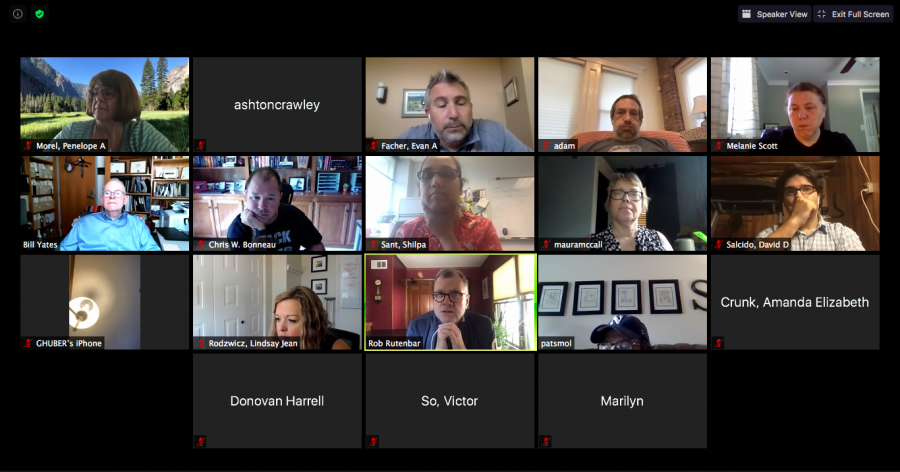‘A giant game of telephone’: Student researchers concerned over gaps in communication
The Senate Research Committee met July 10 to discuss reopening efforts in the midst of the COVID-19 pandemic.
July 28, 2020
As undergraduate students prepare to return to campus next month in the midst of the ongoing COVID-19 pandemic, some graduate students and researchers said safety concerns they’ve raised since research restarted have not been fully heard.
Pitt officially reopened its labs last month, but many researchers had been going into labs throughout the pandemic to preserve their experiments. Lab protocols have largely been left up to individual lab groups, leading many workers to feel “out of the loop.”
Karsen Shoger, a research technician in the department of immunology, said there has been a lag in the administration relaying information to people working in Pitt’s labs.
“Communication from Pitt has been really poor. They’ve not been forthcoming with the decisions they’ve made and why they’re being made,” Shoger said. “It’s also very confusing as to who is making what decisions for which people.”
Shoger said since the official reopening last month, there’s been no way to report concerns besides telling his principal investigator, the person who runs the lab.
“We need a way to directly communicate these concerns with the people that are making these decisions about us, at the bare minimum,” Shoger said. “It’s like one giant game of telephone, which is a huge problem in the middle of a pandemic.”
Jacinto De La Cruz, a graduate student in the School of Medicine, also noticed issues with communication. He said a power imbalance between researchers and their lab managers is affecting their ability to call for changes to lab conditions.
“As grad students, our entire careers can be defined by our Ph.D. mentors,” De La Cruz said. “It makes us nervous to say anything that goes against their will.”
Pitt spokesperson Kevin Zwick said the University Senate’s Research Committee, a shared governance body, includes three student and two staff representatives and has been meeting every other week to ensure open communication during the pandemic.
Zwick added that faculty and lab directors have been instructed to not pressure graduate students who feel uncomfortable returning to a lab, and that research labs have been told to operate in a manner that prioritized health and safety.
“Any student, post-doc or trainee who feels they are being pressured to return but do not feel comfortable doing so should speak to their department chair or dean, or may contact Environmental Health and Safety,” Zwick said.
Melanie Scott, the director of graduate education for surgery research, said her lab altered its floor layout to allow for more space to social distance. People within her labs also have been staggering their shifts.
“From a faculty perspective, where we were, the lab space and bench work wasn’t an issue. Certainly, it was tough to figure out how people would have space to eat,” Scott said. “All of my lab group, when I’ve asked specifically if they have any concerns and they haven’t shared anything with me, so far.”
Scott added that while communication was an issue when reopening started, the situation has improved.
“From a faculty perspective, there wasn’t a lot of information available because things were still in the planning stage,” Scott said. “But once things got up and running, I think the information flow has improved.”
Kimberly Garrett, a Ph.D. student in the Graduate School of Public Health, said she had concerns when the University announced it was restarting research, especially about shared equipment and work spaces.
“The biggest problem to me is that we work in an open lab space, so there are a lot of other lab groups,” Garrett said. “I never received an official ‘coming back’ packet of information — thankfully my adviser sent it to me.”
Students also said there is confusion about how to get tested for COVID-19 if they are experiencing symptoms. The University recently created the COVID-19 Medical Response Office to oversee testing, and according to the office’s website, symptomatic individuals and those with positive COVID-19 test results should call Pitt’s Student Health Service or employee health clinic, MyHealth@Work.
De La Cruz said he recently began displaying COVID-19 symptoms and sought a test. He said his lab’s principal investigator told him to go to the Student Health Service in Nordenberg Hall to get one. But De La Cruz said he believes his experience showed many issues with Pitt’s testing system.
“It’s stated in the reopening statements that we should stay home, get a doctor and go from there. The issue with that is, do we inform our labs? Do we inform our department entirely? How will I care for myself?” De La Cruz said. “A lot of the mental health burden was not factored in.”
De La Cruz said he found the process of figuring out where to obtain a test to be difficult — Student Health told De La Cruz it could not give him a test because it did not take referrals and said he should go to Rite Aid.
“Especially as a graduate student in the School of Medicine, I don’t know whether I’m a Pitt employee or UPMC employee,” De La Cruz said. “To make things even worse, if I don’t have full symptoms, then I can’t get the test. There’s a lot of uncertainty behind it and there was not a lot of transparency, so It’s frustrating.”
Shoger said he hopes conditions and communication within the labs will improve in the coming months.
“There needs to be this infrastructure in place. I think if we were involved in the decision making process, these things would be in place,” Shoger said. “Right now, the only interests that are represented are those of the administration.”



